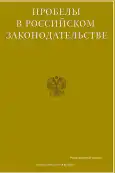Legal Cooperation Between Russia and China in the Field of Protection and Conservation of Biodiversity
- Authors: Zelenina A.A.1
-
Affiliations:
- Kutafin Moscow State Law University (MSAL)
- Issue: Vol 16, No 2 (2023)
- Pages: 61-65
- Section: Public Law (State Law) Sciences
- URL: https://journal-vniispk.ru/2072-3164/article/view/250246
- ID: 250246
Cite item
Abstract
The purpose of the research. The article discusses the legal problems of the functioning of the sphere and the development of mechanisms in the field of protection, conservation and sustainable use of biological diversity of the Russian Federation and the People’s Republic of China. The purpose of the study is to identify ways to solve emerging problems and further prospects for the development of national legislation and the emergence of mechanisms for international cooperation. Results. As a result of the conducted research, the author comes to the conclusion that legal support for the protection, conservation and sustainable use of biological diversity requires improvement of strategic planning documents and mechanisms for their practical implementation. The genesis of the legal regulation of these relations indicates the need to eliminate gaps and conflicts existing in the national environmental legislation of Russia and China. The problem of conservation of biological diversity is trans-border in nature, which determines the high degree of importance of prospects for international cooperation in this area.
Full Text
##article.viewOnOriginalSite##About the authors
Anna A. Zelenina
Kutafin Moscow State Law University (MSAL)
Author for correspondence.
Email: zeleninaannaalex@yandex.ru
postgraduate student
Russian Federation, MoscowReferences
- The «green» agenda in Chinese politics: workbook No. 64 / 2022.
- Vypkhanova G.V. The concept and legal support of the concept of sustainable development // Bulletin of the O. E. Kutafin University. 2016. No. 1 (17).
- Lin B. and Jia Z. What will the carbon trading market in China affect with the participation of the electric power sector only? A study based on CGE. Energy Econ. 2019. №78, 301-311.
- Liu Hong Yan. Development of environmental law in China and Russia: abstract of the dissertation of the Candidate of Legal Sciences : 12.00.06 / Institute of State and Law of the Russian Academy of Sciences. - Moscow, 2005. - 24 p.
- Lyapustin Sergey Nikolaevich, Pervushina Natalia Vladimirovna. On the development of environmental legislation and the role of Chinese Customs authorities in biodiversity conservation // Customs policy of Russia in the Far East. 2008. №2 (43).
- Ma Xin. Prevention of environmental harm as a principle of law in China and Russia: dissertation of ... Candidate of Legal Sciences: 12.00.06 / Ma Xin;[Place of protection: Institute of State and Law of the Russian Academy of Sciences], 2020.
- Moklokova, E. Y. Protection of biological diversity // Young scientist. 2019. № 43 (281).Pp. 147-149.
- Petrov A.A. New control and monitoring systems // Social innovations and social sciences. 2020. No. 1. pp. 128-142.
- Rednikova T.V., Kudelkin N.S., Ma S. State policy of Russia and the People’s Republic of China in the field of environmental protection of the Arctic: prospects for international and bilateral cooperation // International law and international organizations. 2018. N 2. pp. 17 - 31.
- Sevostyanova N. A. Features of biodiversity conservation in Russia // Tsarskoye Selo readings. 2012. №XVI.
- Zhang Mei. The state and prospects of cross-border cooperation in the field of environmental protection between China and Russia // News of the Oriental Institute. 2019. №3 (43).
- Eriashvili N.D., Ivanova Yu.A. On the issue of ecology of modern China // Education and Law. 2022. No. 4. pp. 371 - 375.
- Eriashvili N.D., Ivanova Yu.A., Radchenko T.V. Global problems of mankind and ways to solve them // Bulletin of the Moscow University of the Ministry of Internal Affairs of Russia. 2021. No. 1. pp. 36-42.
Supplementary files








